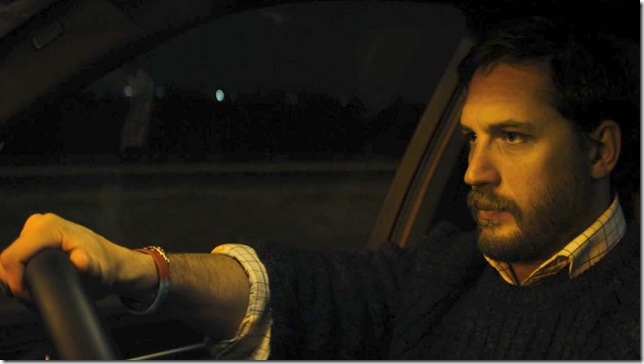Ever since I could get behind the wheel of a car, I’ve had an affinity for long drives. Especially long drives at night, with the glittering beacons of the closest metropolis poetically coloring blankets of highway darkness. For lovers of, to paraphrase a Modest Mouse album title, “long drives for someone with nothing to think about,” the experience of a lengthy, solo p.m. drive can create an almost narcotic ambience, freeing the mind to wander off in unexpected meditations.
It’s an atmosphere that permeates every pore of writer-director Steven Knight’s inventive new one-man movie Locke, a moody nocturne set entirely inside a car during an ostensibly real-time drive from Birmingham, England, to London. Except that in this case, motorist Ivan Locke (Tom Hardy) has too much to think about; the next hour and a half will change the course of his life in every conceivable way.
Locke will spend the majority of his time on the road making hands-free phone calls, trying to diffuse twin crises, both of which accelerate faster than his car. He’s on his way to a hospital to witness the birth of his unwanted child to a coworker with whom he had a one-night stand.
This news, arriving two months prior to the expected date, has put Locke in the position of revealing both his infidelity and the childbirth to his wife via phone, just as she and their two children are awaiting his return from work to watch a soccer game. Speaking of work, he’s also abandoning his job as a developer to visit the hospital, on the very night he’s supposed to oversee a crucial shipment of concrete, a decision that leads to his unceremonious ouster.
Locke’s Bluetooth device becomes a 21st-century Rolodex from Hell. Each call —delivered to and from his wife, his one-night mistress, his supervisor and the co-worker who now must take over the construction project — escalates his problems. He tries to remain pragmatic about it all, talking everyone down with measured rationality. But the more his stresses pile on, the more he succumbs to the emotional tsunamis emanating from his car stereo.
In addition to being an inspiring formal exercise in the number of ways to film a car and its driver in motion, Knight’s film is also an extraordinary gift to the actor behind the wheel. Hardy, an underrated English thespian little known across the pond, delivers his performance of a lifetime here, a slow burn of limited mobility but maximal emotive connection. His agonized expressions bring richness and humanity to a potentially alienating concept film.
But the ironic thing about Locke is that, even though he’s the only character we see in the film, he’s also its most enigmatic figure. Through the timbre of their voices and the diction they choose, we generally understand the characteristics and motivations of his wife Katrina, his one-night stand Bethan, his supervisor Gareth and his subordinate Donal. All of them cast judgments on Locke’s character, and so does Locke himself, but who is correct? What is Locke’s moral center? Is he doing the right thing by sacrificing so much to assuage a mistake? The right thing by whom?
Locke being the ultimate present-tense character, we can’t really judge the guy, but we can certainly feel pity for him, his family and everyone involved in his metastasizing decision. All we really know about Locke is that his father was a deadbeat who abandoned the family. Every now and then, when his flood of phone calls ceases, Locke imagines his old man in the backseat, using him as a target for therapeutic outbursts of rage and defiance — even as he realizes he’s becoming his father with the passing of every inexorable minute.
Whether the ending of Locke is in fact hopeful or heartbreaking will be in the eye of the beholder. Either way, I found it bold and uncompromising, a chatty kindred spirit to J.C Chandor’s wordless All Is Lost. Braver still is Knight’s resistance to Hollywoodize anything about his character’s journey; though he teases us with shots of police cruisers streaming past Locke’s car with sirens blaring, we never see their destination.
There are no action set pieces to distract us from the movie’s emotional disintegration. Locke never smashes into another vehicle, or hits a flat tire, or stumbles onto a game-changing roadside revelation. That would be too easy. It’s much more affecting to see one man’s devastating night play out exactly like it could — and would, and possibly should — and to come to grips with the fact that sometimes, there is no right answer; there’s only the next exit.
LOCKE: Director: Steven Knight; Cast: Tom Hardy; Distributor: A24 Films; Rating: R; Now playing at Cinemark Parisian 20 in West Palm Beach, Cinemark Pompano Beach 18, AMC Aventura 24, Regal South Beach 18, and AMC Sunset Place 24.
